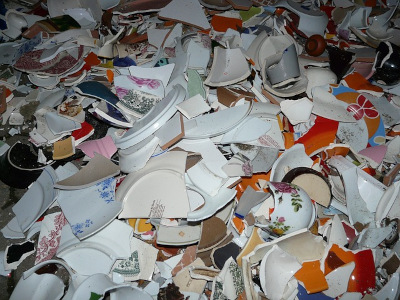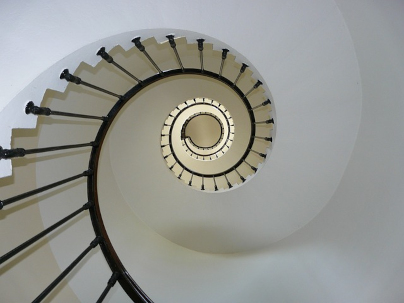After reading the title you might think that I will definitely talk about the Oktoberfest. Since that is the most obvious ‘German’ thing, but I have to say that the Oktoberfest is not that big of a deal in most parts of Germany other than Bavaria. So instead I will focus on small things that almost every German grew up with and that I would describe as actually typically German.

- Dancing into May (Tanz in den Mai) and the May-tree (Maibaum aufstellen)
Dancing into the month of May is something that actually differs a lot throughout Germany. First I have to explain what a Maibaum is. It’s a very tall wooden pole and at the top, you can find one big wreath, decorated with ribbons and signs of different communities. In many parts of Germany, the ribbons hang down to the ground for the dance and often a group performs, dancing around the tree with a ribbon in their hand. Where I am from, this is not very common. Instead, on the 30th of April people gather in bars and clubs and actually dance through the night into the month of May. The 30th is also the day when communities try to steal the Maibaum of surrounding communities. Since it gets set up on the first of May, it’s often laying somewhere the night before, being protected. If a community actually managed to steal it, they give it back the next day in exchange for beer.
- Watching „Dinner for one“
“Dinner for one” is a comedy sketch that was performed in 1962 by two British comedians. It was recorded by the Norddeutscher Rundfunk (NDR) and is shown on German television every year on New Year’s Eve since. The 18-minute sketch is fully performed in English but contains a German introduction briefly describing the content. When I was younger, I didn’t really understand the conversation of the characters but that is not important for it to be funny. It’s about Miss Sophie and her butler James celebrating her 90th birthday with her friends, which she has all outlived. James serves the dinner and imitates all of the guests toasting with her before every course. The main joke is that James gets very drunk throughout the meal since he has to drink in place of the deceased. The most known phrase has to be “The same procedure as last year, Miss Sophie?” and “The same procedure as every year, James”. Ever since I was young, watching “Dinner for one” was a set part of our New Year’s Eve.

- Polterabend
The first time that I heard of Polterabend was when my parents told me about their wedding. Basically, it’s a gathering of people one night in the weeks before your wedding where everyone brings porcelain and smashes it on the ground. Most people just bring old plates they don’t need any more but I have also heard about someone bringing an old toilet. The meaning behind this is that it is supposed to wish the couple good luck in their marriage and it comes from an old German saying “Shards bring luck” (Scherben bringen Glueck). The only important thing to keep in mind is to never bring glass since broken glass is considered unlucky. Another part of this tradition, and to not pollute the environment; it’s the bride and groom’s job to clean everything up again. This is supposed to prepare them for the challenges and hard work that they have to endure during a marriage.

- Not being married at 30
If you don’t get the pleasure of celebrating a Polterabend before you turn 30, you better watch out. This tradition is very dependent on the region of Germany and on the friend group of the designated single. It usually starts with a huge banner in the community of the person, decorated by their friends, stating that someone turned 30 and where the event will take place. If you are an unmarried woman your task is called “Klinkenputzen”. It means, that you have to clean doorknobs, either the ones of your friends or the ones put on a self-made door just for this occasion. This often takes place in a very public place in a very funny costume that your friends picked for you. The doorknobs are usually decorated with all kinds of things that are rather difficult to clean, like ketchup, honey, toothpaste or shoe polish. To clean, the unmarried woman then receives a very small tool, like a toothbrush or a cotton swab and often there is a lot of drinking involved. The male version of this tradition is called “Treppenfegen”. The main idea is that the person has to sweep the stairs of a public staircase like the ones in City Hall. It originated in Bremen and there it’s usually held in the Bremer Dom. To make this harder, just like with “Klinkenputzen”, the friends decorate the stairs with hundreds of caps from beer bottles and the person only gets a really small utensil to clean. And, of course, the man is dressed in a funny costume. Originally, the only way to stop is to be kissed by a virgin of the opposite gender. Since this is sometimes not realistic there are often some variations made.
- Ways of greeting and leaving
Even though this one doesn’t technically count as a tradition, it was the first thing my friends thought of when I asked them about typically German things. When arriving at a gathering with many people that you might not know that well or it would just take a lot of time and effort to greet each person separately, we knock on the table. It’s also used as a way of saying goodbye, for the same reasons. Just a quick knock on the table to let them know that you are heading out. Knocking on the table can also be found in a different context. In school or University, students knock on the table for a couple of seconds, for example after a presentation. Applause can only rarely be found in academic places and is more reserved for Entertainment or performances. It shows respect to the presenter and the knocking when leaving might also come from a place of wanting to pay their respect. A different small thing that every German has seen someone do is the “so” and clapping their thighs when wanting to leave. It’s pronounced with a heavier “O” and everyone around you immediately understands what you mean.
If you ever find yourself in Germany, now you are at least a little prepared for our customs. I hope you enjoyed learning about the little things that made growing up in Germany so unique for me!

